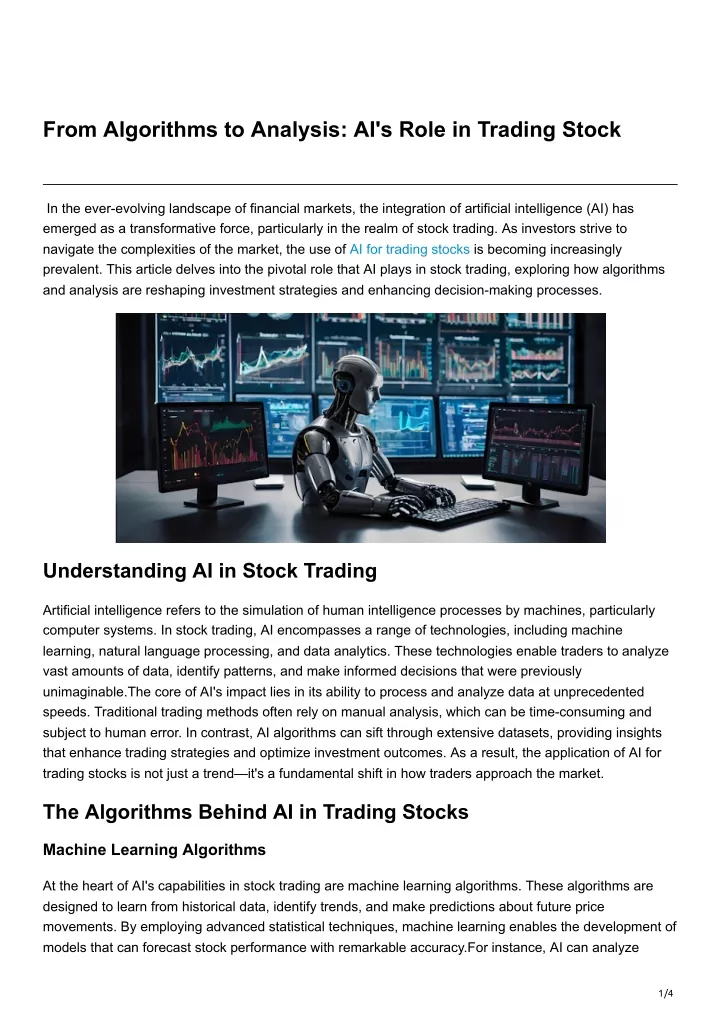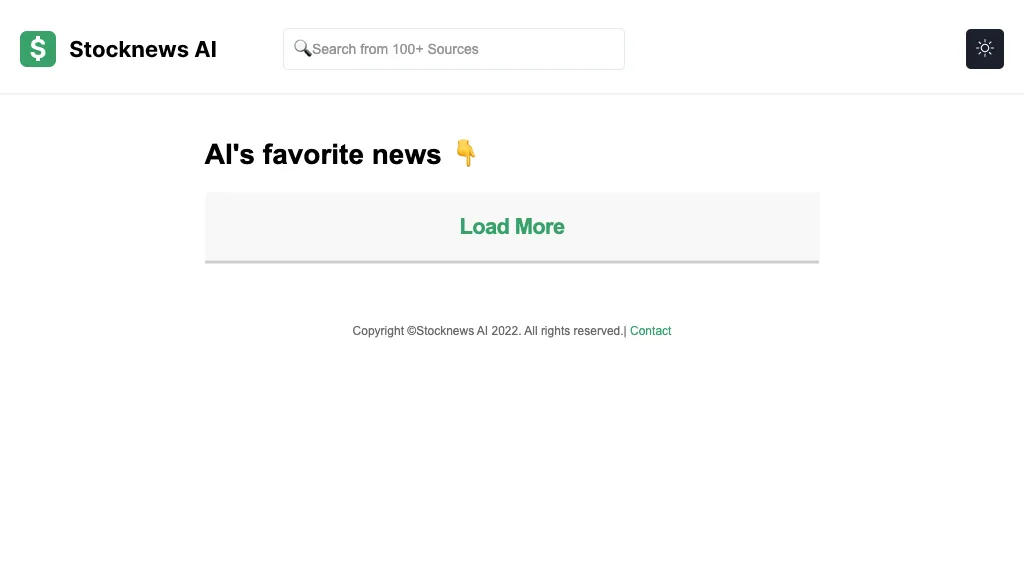20 Recommended Advice To Picking AI Stock Trading Platform Websites
20 Recommended Advice To Picking AI Stock Trading Platform Websites
Blog Article
Top 10 Ways To Evaluate The Accuracy And Performance Of Ai Stock Predicting/Analyzing Trading Platforms
To ensure that you are using a system that can provide accurate predictions and information It is crucial to assess the accuracy and efficacy of AI stock-predicting and analyzing platforms. Here are 10 top suggestions to help you evaluate these platforms.
1. Backtesting Results
What to look for: See whether the platform provides backtesting to determine how well its predictions would've performed using the past data.
Why it Matters: By Comparing the AI model's predictions against actual historical outcomes, backtesting validates its accuracy.
Find platforms that can be customized backtesting parameters.
2. Real-time Performance Monitoring
What to look out for: Evaluate the performance of the platform under market conditions that are in real-time.
Why it's Important: Real-time performances are a better indication of the efficiency of a platform than only historical backtesting.
Try a trial for free or demo account to observe and compare the accuracy of real-time forecasts to actual market activity.
3. Prediction Error Metrics
What to look for: To quantify the accuracy of your predictions, look at measures like mean absolute error (MAE), root mean squared error (RMSE), and R-squared.
Why it matters: These metrics are a quantitative way to gauge how closely predictions are in line with the actual results.
Tip: Platforms which openly share these metrics are generally more transparent and reliable.
4. The winning rate and success ratio
What to look for The platform's success percentage and win rate (percentage correct predictions).
Why it matters The high rate of win and success ratio indicate better forecasting accuracy and potential profits.
You should be wary of platforms which boast of having a very high winning rate (e.g. 90 %+),) since no system can assure 100 100% success.
5. Benchmarking Against Market Indices
What to Look for: Compare predictions and performance of the platform to major market indices.
What's important: This will help you determine if your platform outperforms or falls short of the general market.
TIP: Don't only look for short-term gains, but also an overall performance that is consistent over a longer time.
6. Consistency of Market Conditions
What to Look for: Examine how the platform performs during different market conditions.
Why it matters A solid platform should be able to perform under all conditions of the market and not only when the market is favorable.
Tip: Try the platform during times of volatility or downturns in the market.
7. Transparency in Methodology
What to look out for How to recognize AI algorithms and models (e.g. reinforcement learning or neural networks).
Why It Matters Transparency in the methodology can help you determine the validity and scientific integrity of the platform.
Avoid platforms that use models with "black boxes" without describing the process by which predictions are made.
8. User Reviews and Tests by Independent Parties
What to look for What to look for: Read user reviews and look for independent tests.
Why it's important The importance of independent reviews, tests and assessments provide objective and unbiased information on the platform accuracy and performance.
TIP: Check for reviews on forums such as Reddit, copyright or financial blogs.
9. Risk-Adjusted Returns
What to Watch for The platform's performance can be measured with risk-adjusted metric such as Sharpe Ratio or Sortino Ratio.
Why it's Important: These metrics reflect the risk required in order to gain the desired returns. They offer a more accurate view of overall performance.
Sharpe ratios (e.g. higher than 1) indicate a higher risk-adjusted return.
10. Long-term track record
What to look for: Assess the platform's performance over a longer period (e.g. three years,).
What is important The long-term performance is more reliable than results in the short-term.
Beware of platforms that only display some short-term results or only show a few instances of success.
Bonus Tip: Use a Demo Account to test.
Try a demo account or free trial to test the predictions of the platform in real-time, without risking any real money. This gives you the opportunity to evaluate the accuracy and effectiveness.
Utilize these suggestions to fully evaluate the accuracy, performance, and reliability of AI stock prediction and analysis platforms. It is then possible to select the platform that best aligns with your goals for trading and your risk tolerance. Keep in mind that no platform is able to be trusted, therefore mixing AI insights and your own research along with the platform's predictions is usually the best option. Follow the top rated more hints for trading ai for website advice including chatgpt copyright, best ai trading app, chart ai trading assistant, ai trade, ai trading tools, ai for investment, ai stock trading bot free, ai stocks, ai stock market, investing ai and more.
Top 10 Tips For Assessing The Regulatory Compliant Of Ai Stock Predicting/Analyzing Trading Platform
Regulation compliance is an important element to evaluate AI-based trading platforms. Compliance ensures a platform's operation within legal guidelines. Users data is protected and financial regulations are adhered to, which reduces any risk of legal concerns. Here are top 10 tips on how to evaluate the compliance of these platforms.
1. Verify the License and Registration
Regulatory Authorities: Ensure that the platform registered with the relevant regulatory bodies (e.g. SEC US, FCA UK and ASIC Australia) and holds an appropriate license.
Broker partnerships: Verify that brokers integrated with the platform are licensed.
Public records: Go to the website of the regulator to find out whether the platform is registered or if it has ever violated the law.
2. Assess the privacy of your data Compliance
GDPR - If your site operates in the EU and/or provides services to users in the EU ensure that it is compliant with GDPR.
CCPA: California Consumer Privacy Act compliance is required for all users.
Data handling policies: Review the privacy policies of the platform to make sure it clarifies the methods by which data from users are collected as well as how it is stored and transferred.
3. Evaluating Anti-Money Laundering / AML Measures
AML policies: Make sure the platform is equipped with strong AML policies to stop and identify cash laundering.
KYC procedures: Determine if the platform uses Know Your Customer (KYC) that verifies the identity of users.
Transaction monitoring: Verify that the platform monitors transactions to detect suspicious behavior and inform authorities about suspicious activity.
4. Verify that you are in compliance with Trading Regulations
Market manipulation: Make sure that the platform contains measures to prevent market manipulation, such as fake trading, wash trading.
Types of orders. Verify that the platform conforms to all regulations regarding order type (e.g. there isn't any illegal stop loss hunting).
Best execution: Make sure your platform is following the most efficient execution procedures. This will ensure that transactions are executed at the most competitive price.
5. Cybersecurity compliance assessment
Data encryption. Ensure your platform uses encryption for user data, both in the rest.
Response to incidents: Verify if the platform has a clearly defined incident response strategy for data breaches or cyberattacks.
Certifications: Determine if the platform has cybersecurity certifications (e.g., ISO 27001, SOC 2).
6. Transparency Disclosure, Transparency and Evaluation
Disclosure of fees - Make sure all fees are revealed, including extra charges or hidden costs.
Risk disclosure: Verify whether the platform has clear risk disclosures. Particularly for high-risk and leveraged trading strategies.
Performance reporting: Ensure that the AI platform is transparent and provides precise performance data to its AI model.
7. Check the Compliance to International Regulations
Cross-border Trading: If you're trading involves international trade, you should ensure that your platform is compliant with all regulatory requirements in each country.
Tax reporting: Check whether the platform offers tools or reports to help users comply with tax regulations (e.g., FIFO rules in the U.S.).
Conformity with sanctions: Ensure that the platform follows sanctions to the sanctions and will not allow trading or dealings with banned countries or entities.
8. Examine the records-keeping and audit trail
Transaction records: To meet regulatory and auditing reasons, make sure that the platform maintains complete records of all transactions.
Logs of user activities Verify that your platform tracks all activities by users, including logins, transactions, and account settings changes.
Audit readiness: Make sure that the platform can provide necessary documents and logs in the event of a regulatory audit.
9. Make sure you are in compliance with AI-specific Regulations
Algorithmic trade rules: If your trading platform has algorithms, make sure it is in compliance with the rules of MiFID II for Europe or Reg. SCI for the U.S.
Fairness and Bias: Ensure that the platform is monitoring, and mitigates, biases within its AI models to ensure fair trading.
Explainability. Certain regulations may need the platform to describe AI-driven predictions and decisions.
Review User Feedback & Review History of Regulatory History
User reviews: Check out user feedback and then compare it with the platform's compliance with norms of the industry.
Historical Record: Search for violations in the past of regulations, fines or penalties.
Third-party audits: Determine that the platform has regular audits by a third party to ensure compliance with the regulations.
Bonus Tips
Legal consultation: Consult an expert in the field to determine whether your website is in compliance with the regulations.
Trial period: Test the platform for free, or utilize the demo feature to test the compliance features and documentation.
Support for customers: Make sure the platform provides support for compliance-related questions or concerns.
These tips will help you evaluate the legality of AI trading platforms that forecast or analyze price of stocks. In this way you can pick a trading platform that is legal, and safeguards you. The compliance not only reduces the risk to legality, but also builds confidence in the service of a platform. Take a look at the recommended investing with ai advice for blog advice including ai trading tool, ai stock predictions, ai stock analysis, ai stock price prediction, stock predictor, free ai tool for stock market india, ai investment tools, ai options, chart analysis ai, ai for trading stocks and more.